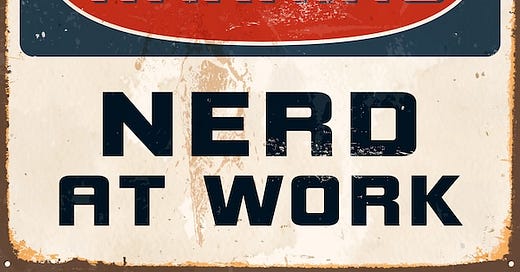I’m a nerd, and proud of it. So let me speak for a moment to my fellow nerds who also write. It’s time we talked about how nurturing your inner nerd could be just what you need to jump-start your writing.
What is it about this personality trait that foreshadows literary success? Well, an online search of the term revealed a list of characteristics, and I’d like to focus on three of them.
Rule #1: Nerds show a pronounced interest in things that others might find dull or boring.
Do you get excited about the sales data of Hush Puppy shoes and how they compare to a syphilis outbreak in Baltimore?
Well, maybe you should. Malcolm Gladwell pondered abstract ideas like these, and while his friends were probably at the bar partying, he curled up with his laptop and poured that stuff into his book called “The Tipping Point.” It sold more than five million copies.
Sure, nerds show a pronounced interest in topics that others might not find interesting. But isn’t that what makes a terrific writer? Someone who can take what we might consider boring and spin it into gold?
Science fanatics like me feel that Andy Weir is a kindred spirit. Truly a math/science nerd, he took that specialized knowledge and crafted a smash hit called “The Martian,” then turned around and dazzled us with “Project Hail Mary.”
These are two science-based novels that—let’s just say it—totally kick ass. They’re nerdy, sure, but they’re entertaining as hell. Weir is my kind of nerd.
Rule #2: Nerds sometimes display symptoms of obsessive-compulsive disorder by showing extreme interest in rules.
Oh yeah? You mean the writing rules that have been pounded into our heads, like Keep your butt in the seat, or Never edit while writing?
Forget those. I prefer these writing rules:
Elmore Leonard: Try to leave out the parts that readers tend to skip.
Kurt Vonnegut: Start as close to the end as possible.
Or Hemingway’s rule: I write one page of masterpiece to ninety-one pages of shit. I try to put the shit in the wastebasket.
Personally, as a writer I try to follow a rule I borrowed from an old Turkish proverb:
No matter how far you’ve traveled down the wrong path, turn back.
For me, it means that no matter how many pages I’ve written in what’s obviously a lackluster scene, I go back and take another route.
So we have tired, overused rules, and then we have lesser-known nuggets that help us take the jumbled, chaotic thoughts in our head and condense them into a structured, polished gem.
Rule #3: Someone who is unable or unwilling to follow trends.
Hooray for not following trends! This is where some writers have lost their nerd compass. They get distracted by things like, oh, paying the rent and putting food on the table, and they cave to the temptation to follow the crowd.
It’s why, between 2005 and 2015, we got five million vampire novels following the explosion of the “Twilight” series, and why the market was flooded with “mommy porn” in the wake of “50 Shades Of Grey.”
All it took was a couple of bestselling novels to make a word trendy. “Gone Girl” and “The Girl on the Train” led to a stampede of books with “Girl” in the title. I mean, it was insane. Authors and publishers rushed to capitalize on this one-word trend.
The most inspiring nerds, however, are the ones who START a trend. Hello? Steve Jobs, anyone? George Lucas? And while he was by no means the first person to write horror, it’s fair to say Stephen King made it mainstream in the late 20th century. He was a trendsetter in many ways.
If the worst thing I can be accused of as a nerd is that I don’t follow the crowd, I say hallelujah. The crowd is generally dull.
Those are just three traits that, as writers, we should celebrate. So have a heart-to-heart with yourself and decide:
Are you nurturing your inner nerd?
Are you able to recognize the traits that inevitably will lead to a published book in your future?
Or are you caught up in trying to avoid society’s negative association with the word nerd?
Please don’t. Own it. Embrace it. Nurture it.
But still keep your butt in the seat.
Dom Testa is a nerd who writes fiction and non-fiction, and has been known to squeal with delight when presented with a new jigsaw puzzle. Find his work at DomTestaBooks.com.




